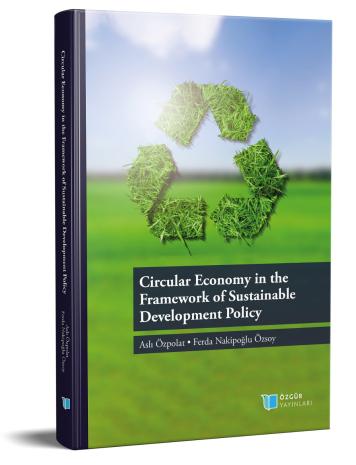
Sürdürülebilir Kalkınma Politikaları Çerçevesinde Döngüsel Ekonomi
İndir
Özet
Sanayi devriminden bu yana yaşanan ekonomik ve toplumsal dönüşümler, ülkelerin gelişme ve büyüme süreçlerinde önemli faydalar yaratmıştır. Ancak bu faydaların yanı sıra çevresel düzeyde meydana gelen sorunlar, gelişme süreçlerinde belirli zararlara yol açmıştır. Ne yazık ki bu bağlamda geliştirilen politikalar yeterli olmamıştır. 2015 yılında imzalanan Paris anlaşmasında imzacı ülkeler çevreye verilen zararı en aza indirmek için gerekli düzenlemeleri yapmayı taahhüt ettiler. Buna bağlı olarak, sera gazı emisyonlarının azaltılmasına yönelik çeşitli politika önerileri bulunmaktadır. Bu anlaşma dışında çevre sorunlarını en aza indirgemek için birçok politika, program ve eylem planı geliştirilmektedir. Bu alandaki en önemli gelişmelerden biri yeşil ekonomik dönüşüm ve döngüsel ekonomidir (CE). CE, kaynakların yeniden kullanımını içeren bir kavram olmakla birlikte, atık yönetimi, enerji yönetimi, karbon emisyonlarının azaltılması gibi yeşil ekonomik dönüşümü destekleyen birçok unsuru içermektedir. Ek olarak, CE, atık olan ve malzemeleri (su, enerji vb.) tüketen sürdürülebilir bir şekilde mal ve hizmet üretmek için ekonomik bir modeli ifade eder. Bu arada, CE, SDG 17 hedeflerini desteklemektedir. Bu nedenle, CE'ye geçiş, sürdürülebilir kalkınmayı destekleyecek önemli bir adımdır. Halihazırda Türkiye'de uygulanan sıfır atık projeleri ile kaynak yönetimine ve çevresel sürdürülebilirliğe önemli katkılar sağlanmıştır. Ayrıca 11. Kalkınma Planı'nda yer alan sıfır atık hedefi kapsamında, geri dönüşüm oranı 2023'te %13'ten %35'e yükselmiştir. Uygulamanın yaygınlaşmasıyla birlikte geri dönüştürülen bina sayısının önemli ölçüde artacağı belirtiliyor. Ayrıca atık yönetimi, Avrupa Birliği'nin çevre politikasındaki temel unsurlardan biridir. Atık yönetiminin amacı, AB Uygulama Raporunda (2018) “çevreyi ve insan sağlığını korumak ve AB'nin döngüsel ekonomiye geçişine yardımcı olmak” olarak belirtilmektedir. Ayrıca AB, mevcut ekonomik kalkınma modelini daha sürdürülebilir bir modele yönlendirmek için bir Eylem Planı oluşturmuştur. Bu eylem planı, ürünlerin, malzemelerin ve kaynakların değerinin mümkün olduğu kadar uzun süre korunacağı ve atık oluşumunun en aza indirileceği bir CE'ye geçiş planını içerir. İklim değişikliği ve yarattığı etkiler, başta ekonomik ve politik teori ve yaklaşımlar olmak üzere birçok alanda değişim ihtiyacını ortaya çıkarmıştır. Bu alandaki çalışmalar iktisat literatüründe de oldukça yaygındır. Elinizdeki bu kitapla döngüsel ekonomi tartışmalarına yeni bir pencere açmaya çalıştık. Çok değerli akademisyenlerin yer aldığı bu çalışmaların döngüsel ekonomi tartışmalarına ışık tutmasını temenni ediyoruz.

